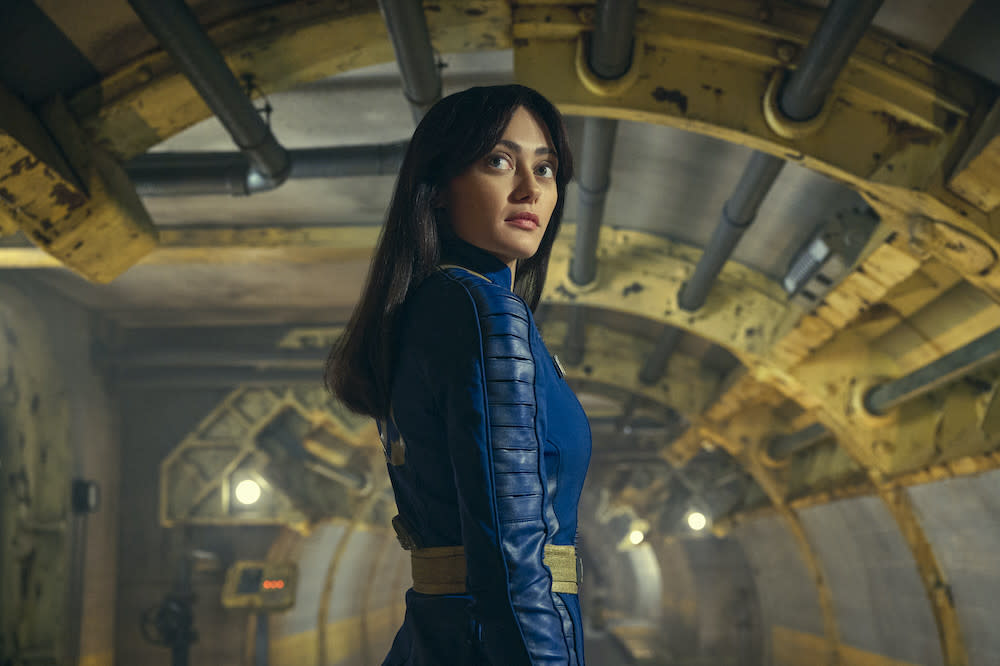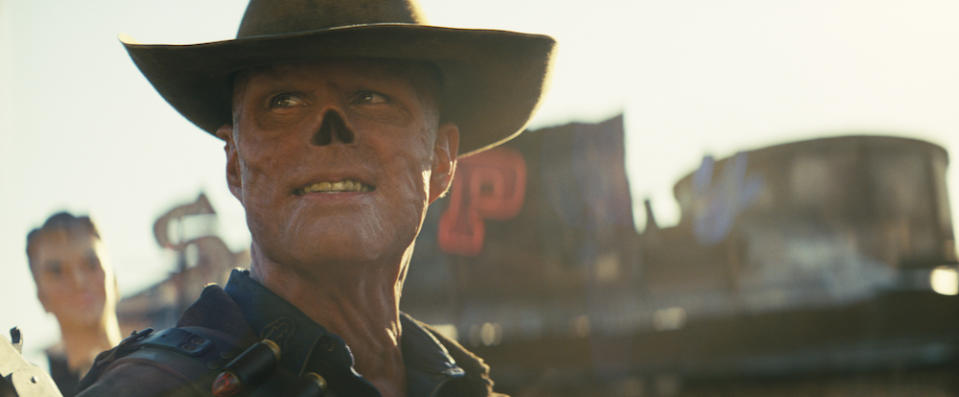‘Fallout’ Review: Amazon’s Slick, Cynical Vision of the Post-Apocalypse Is a Ghoulish Adventure

- Oops!Something went wrong.Please try again later.
Lucy (Ella Purnell) has only been outside the relative safety of her vault for a few hours before the young, wide-eyed school teacher — who specializes in American History “with a focus on ethics!” — is attacked by a cockroach the size of an adult corgi. Technically, she’s spared the hand-to-leg combat thanks to an actual dog (a German Shepherd), who jumps out of the shadows, chomps down on the mutant insect, and makes a meal of the squealing, writhing creature. But the interaction is nonetheless indication of her predicament. Lucy, who’s lived her entire life in an underground society dictated by laws, common goals, and good manners, isn’t prepared to be out in this anarchic desert wasteland. Her bright blue jumpsuit may shield her from the radiation, but it won’t protect her from the parasites ready to pounce as soon as she lets down her guard.
So Lucy has a choice, conveniently vocalized by the dog’s owner, who watched in indifferent silence as his canine companion saved her life. “If you insist on staying [on the surface], then will have to adapt,” he tells Lucy. “The question is: Will you still want the same things, when you’ve become a different animal altogether?”
More from IndieWire
“Fallout” poses this question again and again, often with the same implication that in order to survive, the kind and innocent need to wake up to the cruel realities of the dark world around them. The series, after all, is a survival story. Its origins and central theme align with “The Last of Us,” another video game adapted under the prestige TV model that asked why we cling to life after experiencing the worst of humanity.
But “Fallout” skews closer to “Westworld” and “The Boys,” parceling out puzzles to be played over eight episodes and dropping morbid jokes about everything from decapitated heads to exploding penises. There’s also an anti-capitalism message that takes shape over the season’s latter half (in yet another example of Amazon having its cake and eating it, too), all of which gives Geneva Robertson-Dworet and Graham Wagner’s hourlong drama topical talking points, but only surface-level substance. If you can separate the slick world-building from the soul-deadening cynicism, “Fallout” should fly by as the bloody action spectacle it’s made to be. Otherwise, it’s hard to shake the creeping sensation that your basic goodwill is under attack.
Lucy is one of “Fallout’s three leads, each of whom carries their own story arc. Hers begins in the vaults, a series of connected yet largely siloed shelters that helped their inhabitants survive underground for hundreds of years. Her father, Hank (Kyle MacLachlan), is the “Overseer,” a leader elected to the position as much for his smiley, enthusiastic demeanor as his background in science. Everyone in the vault helps out in one way or another — farming, cooking, fixing things — but “after 10 years of cousin stuff,” Lucy’s next assignment is to get hitched. Her kids should be the first generation to live on the surface and recolonize the planet, which makes the benevolent daughter all the more eager to get down with her chosen hubby.
Well, the husband who has been chosen for her, to be clear. Monty (Cameron Cowperthwaite) arrives as part of a trade with another vault, and despite their idyllic wedding venue (a cornfield enhanced by projectors to create a lovely summer evening), things start to go wrong as soon as the vault doors are opened. It’s almost as though, in the world of “Fallout,” letting people in emotionally and physically, literally and emotionally, is an extremely dangerous idea?

Soon, after a series of events that Amazon has deemed spoilers (despite forming the show’s premise), Lucy is out on her own, forced to decide whether she should harden her heart in order to protect it, or trust that her sweet, sensitive nature will be met with comparable compassion. One big hint as to which outcome is more likely comes in the form of our second lead, Maximus (Aaron Moten). Raised in the Wasteland (aka on the surface) and adopted by the Brotherhood of Steel (aka a military group led by “knights” in hulking suits of armor), Maximus knows how to follow orders, but he’s also got an unhealthy ego and a Napoleon complex. He’s not short in stature, but he has been beaten and verbally abused by his higher-ups and so-called buddies long enough to harbor a nasty, curdling jealousy.
Maximus’ quest is by far the most miserable aspect of “Fallout,” as the character’s villainous origins give way to an undeserved hero’s arc. Not only is he hard to like (through no fault of Moten, who strains to evoke pity whenever possible), his mission is also helped along by too many convenient twists and turns. (In a world as brutal as “Fallout’s,” how is Maximus always getting beaten senseless, but never getting killed?) Luckily, the third member of our starring trio is so innately charismatic, not even a faceful of latex can damper his charms. Walton Goggins plays the Ghoul, a half-dead bounty hunter resurrected to hunt down a macguffin that brings all three of our protagonists together. He’s also our only conduit to the pre-apocalypse, when he went by Cooper Howard and only pulled a gun on camera. That’s right, back in the day, Cooper was a famous big-screen cowboy, and how his personal fall from grace connects to society’s is a well-teased mystery with a decent payoff in the season finale.
With Jonathan Nolan directing the first three episodes, “Fallout’s” classic Western aesthetic blends seamlessly with its futuristic mechanical sheen. The vaults feel labyrinthine and lived-in, the desert wide open yet teeming with danger. Having not played the video games, I can’t speak to how much credit goes to past artists, but the look, pace, and structure of “Fallout” aren’t the problem. What weighs the series down is its repetitiveness.
Contrasting superficial cheeriness with blood-splattered violence is only effective so many times, and the inviting retro stylings of Lucy and her civil community quickly turn against them. Vault Tech’s logo is a ’50s era cartoon kid offering his onlookers perpetual encouragement, but Vault Boy’s thumbs up is more like a thumb in the eye to what “Fallout” paints as an outdated belief system. The neighborly gestures of the Cold War era — the very niceties that keep the peace in personal relationships as well as political negotiations — are just fodder for ridicule. Why play nice when everyone is so clearly out for themselves? If that’s a worldview you can adopt, even for eight hours, then “Fallout” should prove entertaining enough. Otherwise, it’s hard to appreciate the world Lucy is trying to save.
Grade: C
“Fallout” premieres Wednesday, April 10 at 9 p.m. ET on Amazon Prime Video. All eight episodes of the first season will be available at once.
Best of IndieWire
Sign up for Indiewire's Newsletter. For the latest news, follow us on Facebook, Twitter, and Instagram.

